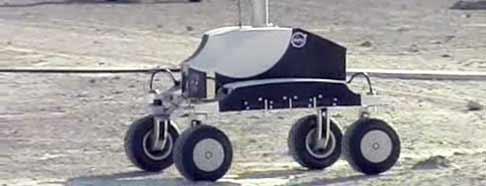Robots Replace Humans as the Great Explorers

In Robot Madness, LiveScience examines humanoid robots and cybernetic enhancement of humans, as well as the exciting and sometimes frightening convergence of it all. Return for a new episode each Monday, Wednesday and Friday through April 6.
Human curiosity and competition launched the first men into space and to the moon, but robots have gone just about everywhere else in the solar system.
There are good reasons for this — for starters, robots remain far better adapted to exploring the harsh environments of space and other planets. So now some experts suggest that human space explorers may eventually merge with machines to become a tougher breed.
That toughness has shown itself in robots investigating the red planet, notably the Spirit and Opportunity rovers that have kept exploring since they first landed in 2004 and completed their initial 90-day mission. By contrast, humans have yet to leave the relative safety of Earth orbit and the moon, in part because of dangers from deep-space radiation exposure.
The Cassini spacecraft remains watchful over Saturn's rings and moons after 11 years of flight, with NASA already planning to extend its tour of duty through 2017. Further out, the Voyager space probes have pushed through the very edge of the solar system to reach interstellar space.
Robots certainly don't hog all the glory — human spaceflight on the space shuttle and International Space Station can still excite both kids and adults, not to mention the current U.S. president and a certain comedian named Stephen Colbert, who may get a space toilet named after him. But public attitudes may have changed with the times to also welcome increasingly sophisticated robot brethren.
{{ video="LS_090309_08_WeGo" title="We Will Go!: Human/Robot Mergers Explore Space" caption="Our robotic offspring will carry us to the stars. But who, actually, will we then be? Credit: Thomas Lucas, Producer / Rob Goldberg, Writer" }}
Sign up for the Live Science daily newsletter now
Get the world’s most fascinating discoveries delivered straight to your inbox.
Surveys have shown that younger people in particular have grown attached to the Spirit and Opportunity rovers, even as they balk at the billions upon billions of dollars it would cost to send humans to Mars. NASA has encouraged this growing fondness for its robotic explorers by having its Phoenix Mars Lander and other agency spaceships send short messages to online followers on Twitter (of course, a human at NASA "speaks" for the craft), and by opening a naming contest for the upcoming Mars Science Laboratory rover.
And even as the U.S. space agency has announced plans to return humans to the moon, robots will go first to scout things out. Even private companies are getting in on the act: The Google Lunar X Prize has lured many private space firms to try and land a robot on the lunar surface by 2012.
Return Monday for Episode 10: Write the Future - Is Your Great Grandchild a Robot?
- Video - We Will Go!: Human/Robot Mergers Explore Space
- Robot Madness Episode 8: Stepping Out of Sci-Fi
- More Robot News and Information










